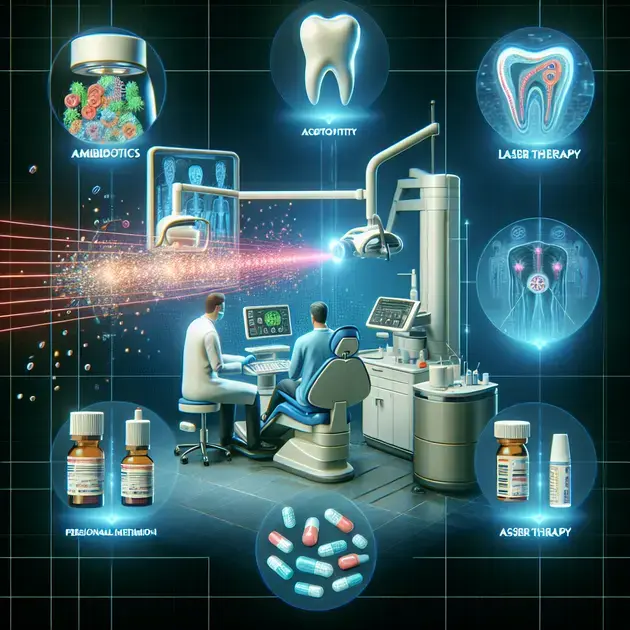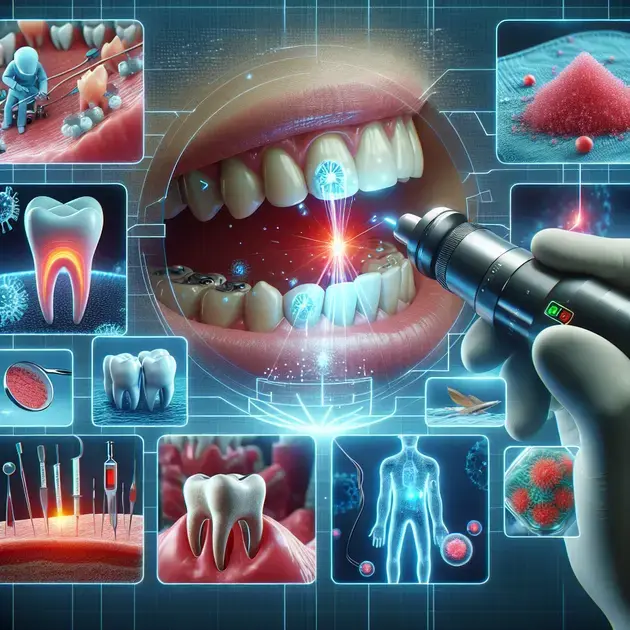Are you looking for an effective medication for periodontitis? Look no further. This comprehensive guide will provide you with all the information you need to understand the best treatment options available.
Periodontitis is a serious gum infection that damages the soft tissue and destroys the bone supporting your teeth. It is crucial to seek the right treatment to prevent further complications. In this guide, we will explore the most effective medications and strategies to combat periodontitis and regain your oral health.

Understanding Periodontitis Treatment Options
When it comes to options for treating periodontitis, it’s important to understand the various methods available to improve gum health and prevent further deterioration. One effective treatment option is scaling and root planing, a deep cleaning procedure performed by a dental professional to remove plaque and tartar from below the gumline. This procedure helps to eliminate bacteria and reduce inflammation, promoting healing of the gums.
Another treatment option for periodontitis is the use of antibiotic medications, either in pill form or as a mouth rinse. These antibiotics can help to reduce bacterial infection in the gums and promote healing. In some cases, surgical intervention may be necessary to remove deep pockets of infection and restore gum health.
It’s also important for individuals with periodontitis to practice good oral hygiene at home, including regular brushing and flossing, as well as using an antimicrobial mouthwash to help reduce bacteria in the mouth. Regular dental check-ups and cleanings are essential for monitoring the progress of treatment and addressing any new issues that may arise.
For more information on periodontitis treatment options, you can visit reputable dental websites such as the American Academy of Periodontology (AAP) or consult with a qualified periodontist who can provide personalized recommendations based on your specific dental health needs.
Recommended App: American Academy of Periodontology (AAP) – Official App
The Best Medications for Periodontitis
Choosing the right medications for treating periodontitis is essential for effectively managing the condition and promoting gum health. One common medication used in the treatment of periodontitis is chlorhexidine gluconate, which is an antimicrobial mouth rinse that can help reduce bacteria and inflammation in the gums. This medication is typically prescribed by a dentist or periodontist and should be used as directed for optimal results.
In some cases, antibiotic medications such as doxycycline or minocycline may be prescribed to help combat bacterial infection in the gums. These medications are often used in conjunction with other treatments, such as scaling and root planing, to achieve the best outcomes. It’s important to follow your dentist’s recommendations for medication use and attend follow-up appointments to monitor your progress.
Other medications that may be recommended for treating periodontitis include nonsteroidal anti-inflammatory drugs (NSAIDs) to help reduce pain and inflammation, as well as prescription-strength mouthwashes to help control bacteria in the mouth. It’s important to discuss any medication options with your dental provider to ensure they are safe and effective for your individual situation.
For more information on the best medications for periodontitis, you can consult with your dentist or periodontist, who can provide personalized recommendations based on your specific oral health needs and medical history.
Recommended Website: American Dental Association (ADA) – Medications and Oral Health
Strategies for Combating Periodontitis
Combatting periodontitis requires a multi-faceted approach that includes a combination of professional treatment and good oral hygiene habits at home. One important strategy for combating periodontitis is to brush and floss regularly to remove plaque and bacteria from the teeth and gums. Using an antimicrobial mouthwash can also help reduce bacteria in the mouth and promote gum health.
Another key strategy for combating periodontitis is to quit smoking, as smoking can worsen gum disease and inhibit the body’s ability to heal. Maintaining a healthy diet rich in fruits, vegetables, and whole grains can also support gum health and overall well-being. Drinking plenty of water and avoiding sugary foods and drinks can help prevent bacteria growth in the mouth.
In addition to these lifestyle changes, it’s important to visit your dentist regularly for professional cleanings and check-ups. Your dentist can monitor the progress of your periodontitis treatment and make any necessary adjustments to your plan. If surgical intervention is needed, following your dentist’s post-operative instructions is crucial for a successful recovery.
For more tips on combating periodontitis and maintaining good oral health, you can visit reputable dental websites such as the British Society of Periodontology or speak with a dental professional who can provide personalized advice and guidance.
Recommended App: British Society of Periodontology – Periodontal Risk Assessment Tool

Effective Medication for Periodontitis: A Comprehensive Guide
Periodontitis is a serious gum infection that damages the soft tissue and destroys the bone that supports your teeth. Without proper treatment, periodontitis can lead to tooth loss and other health problems. In this comprehensive guide, we will explore the most effective medication options for treating periodontitis.
1. **Antibiotics:** Antibiotics may be prescribed to help control bacterial infections that cause periodontitis. Common antibiotics used for periodontitis include doxycycline, minocycline, and metronidazole. These antibiotics can be taken orally or applied directly to the affected area.
2. **Antiseptic mouthwash:** Antiseptic mouthwashes, such as chlorhexidine, can help reduce bacteria and prevent plaque buildup in the mouth. Regular use of antiseptic mouthwash can aid in controlling periodontal infections.
3. **Anti-inflammatory drugs:** Nonsteroidal anti-inflammatory drugs (NSAIDs) can help reduce inflammation and pain associated with periodontitis. Ibuprofen is a common NSAID that may be recommended by your dentist.
4. **Enzyme suppressants:** Enzyme suppressants like subantimicrobial-dose doxycycline (SDD) can help reduce the body’s enzymes that break down gum tissue. By inhibiting these enzymes, SDD can help slow down the progression of periodontitis.
5. **Bone growth stimulants:** In severe cases of periodontitis where bone loss has occurred, bone growth stimulants may be used to promote the regeneration of bone tissue. These medications can help restore the support structure for your teeth.
Exploring Innovative Treatment Solutions
As researchers continue to explore new treatment options for periodontitis, innovative solutions are being developed to improve patient outcomes and oral health. Let’s delve into some of the cutting-edge treatment approaches that are shaping the future of periodontal care.
1. **Laser therapy:** Laser technology is being increasingly used in the treatment of periodontitis. Laser therapy can target and remove infected tissue, reduce inflammation, and promote healing without the need for traditional surgery.
2. **Platelet-rich plasma (PRP) therapy:** PRP therapy involves using the patient’s own blood components to promote tissue regeneration and accelerate healing. PRP can aid in the repair of damaged gum tissue and support the overall health of the gums.
3. **Stem cell therapy:** Stem cells have the potential to regenerate damaged tissues, including gum tissue affected by periodontitis. Stem cell therapy holds promise for restoring the health and function of the gums in advanced cases of periodontitis.
4. **Probiotics:** Probiotics are beneficial bacteria that can help restore the natural balance of microorganisms in the mouth. By promoting a healthy oral microbiome, probiotics may aid in preventing and managing periodontal diseases.
5. **Ozone therapy:** Ozone therapy involves the use of ozone gas to disinfect and treat infected gum tissue. Ozone has antimicrobial properties that can help eliminate harmful bacteria and promote gum healing.
Optimizing Oral Health with Advanced Medications
Advanced medications play a crucial role in optimizing oral health and managing periodontitis effectively. By incorporating innovative medications into your oral care routine, you can improve the health of your gums and reduce the risk of complications associated with periodontal diseases.
1. **Extended-release drug delivery systems:** Advanced medications with extended-release formulations ensure sustained release of active ingredients, enhancing their effectiveness in treating periodontitis. These specialized drug delivery systems can improve medication adherence and therapeutic outcomes.
2. **Customized medication regimens:** Tailored medication regimens based on individual patient needs can optimize treatment outcomes for periodontitis. Personalized medication plans address specific oral health concerns and support long-term gum health.
3. **Bioadhesive oral patches:** Bioadhesive patches containing active medications can be applied directly to the gum tissue for targeted treatment of periodontitis. These patches adhere to the gums, delivering therapeutic agents directly to the affected area.
4. **Nanotechnology-based treatments:** Nanotechnology offers innovative solutions for enhancing the delivery and effectiveness of periodontitis medications. Nanoparticle-based drug delivery systems can improve drug stability and bioavailability in the oral cavity.
5. **Immunomodulatory agents:** Immunomodulatory medications target the immune response in the gums, helping to regulate inflammation and prevent tissue damage caused by periodontitis. By modulating the immune system, these agents support overall gum health and healing.
Conclusion
Effective medication plays a crucial role in combating periodontitis, a severe gum infection that can lead to tooth loss and other health complications if left untreated. Antibiotics, antiseptic mouthwashes, anti-inflammatory drugs, enzyme suppressants, and bone growth stimulants are among the key medications used to control and manage periodontitis.
Exploring innovative treatment solutions such as laser therapy, platelet-rich plasma (PRP) therapy, stem cell therapy, probiotics, and ozone therapy showcases the continuous advancements in periodontal care. These cutting-edge approaches aim to target and eliminate infections, promote tissue regeneration, and restore gum health through state-of-the-art techniques and therapies.
Optimizing oral health with advanced medications, including extended-release drug delivery systems, customized medication regimens, bioadhesive oral patches, nanotechnology-based treatments, and immunomodulatory agents, offers personalized and efficient ways to enhance treatment outcomes for periodontitis. By incorporating these innovative medications into oral care routines, individuals can significantly improve gum health and reduce the risks associated with periodontal diseases.



